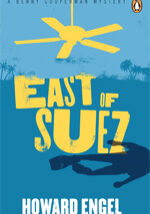In 701 B.C. the Assyrian empire was in its ascendancy. It had already vanquished the kingdom of Israel to the north including the capital at Samaria. It then prepared an assault on Judah and its capital at Jerusalem.
But in one of those significant events that changes the course of world history, Assyria was repelled. Jerusalem was saved until 586 B.C. when the Babylonians sacked the city, forcing its leadership class into exile.
Henry Aubin, in a major feat of scholarship, determines that Jerusalem was aided by a Kushite army from Africa which had marched northeast from the Nile valley. While the Bible attributes the Assyrian retreat to an angel and secular commentators cite pestilence, Aubin, in a meticulously documented work, demonstrates that an alliance with the African nation of Kush bolstered Jerusalem’s defences.
Kush, also known as Nubia, was located in what is now southern Egypt and northern Sudan. A monarchy that existed for more than 1000 years, from 900 B.C. to A.D. 350, Kushites held sway over Egypt from 712 B.C. to about 660 B.C. Of Egypt’s 31 dynasties, this, the 25th Dynasty, is the only one that all scholars agree, was black.
The commander of the Kushite expeditionary force was Taharqa (or as the Bible calls him Tirhakah). This Kushite prince, who had his own interests in halting Assyrian expansion, likely caught the aggressors by surprise as they prepared their siege of Jerusalem.
Aubin offers a thrilling military history and a stirring political analysis of the ancient world. He also sees the event as influential over the centuries.
The Kushite rescue of the Hebrew kingdom of Judah enabled the fragile, war-ravaged state to endure, to nurse itself back to economic and demographic health, and allowed the Hebrew religion, Yahwism, to evolve within the next several centuries into Judaism. Thus emerged the monotheistic trunk supporting Christianity and Islam.

“The great Canadian detective did not exist until Howard Engel invented Benny Cooperman.”
Andrew Ryan
Globe and Mail
Howard Engel has been honoured with the Arthur Ellis Award for Crime Fiction, the Derrick Murdoch Award, the prestigious Matt Cohen award for literature, and the order of Canada. His novels have been adapted for film and radio and translated into more than a dozen languages.
He grew up in St. Catharines, Ontario a few miles north of Buffalo, New York which is the model for his fictional Grantham. He now lives in Toronto.
Penguin Canada 2008
Millionhouse Korea 2009
East of Suez
Having just recovered from a brutal attack, Benny Cooperman is ready to hang up his gumshoes for good. That is, until his old friend Vicky shows up and pleads with Benny to help her find her husband Jake.
She last saw Jake in Miranam on the Malay Penisula where they were running a tourist business, ferrying scuba divers to a celebrated reef. Their life savings, a fortune in diamonds, has also gone missing.
Benny jets off in search of Jake and finds a world where life is cheap and nothing is what it seems.
People disappear and dead bodies turn up, but ever the detective, Benny finds a new lease on life and realizes he’s not ready to give up sleuthing just yet.
East of Suez is the 12th in Howard Engel’s Benny Cooperman mystery series.